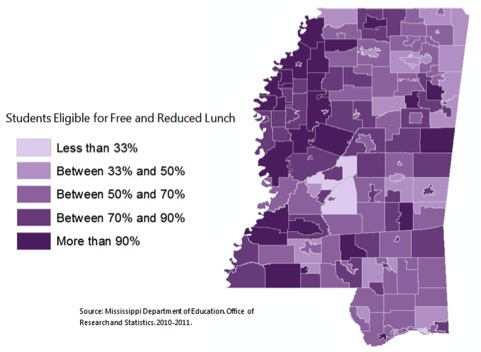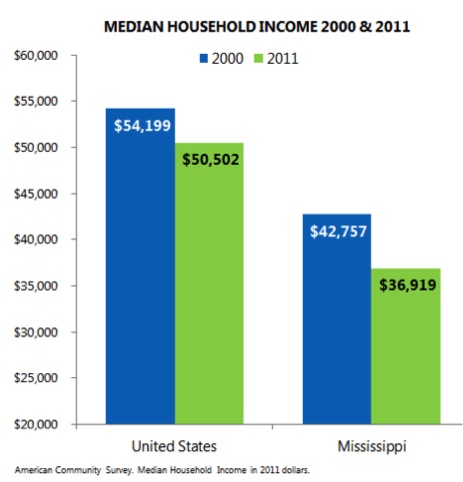CONSIDERATIONS FOR THE 2013 LEGISLATIVE SESSION
January 11th, 2013
January 8th marked the beginning of Mississippi’s 2013 Legislative Session. Bills will be drafted, filed and debated over the next several weeks in Jackson.As the session proceeds, there are several trends among Mississippi’s families that warrant consideration and incorporation into the legislative debate.
The first comes from a look at Mississippi’s household income over the decade. Over the last 11 years, the income of Mississippi’s middle-tier households has fallen markedly, straining the budgets of many families. From 2000 to 2011, median household income fell $5,800 to $36,919 (see chart). This amount is equal to a loss of $470 per month for Mississippi’s median household, a substantial drop that affects a family’s ability to cover their expenses and needs. Mississippi’s household income has fallen 13.6%, a rate two times the nation’s decline of 6.8%.
During the 2013 session, proposals that connect working families with affordable access to health insurance, higher education, and lending products will be critical in helping families remain secure during this challenging economic climate and in the years ahead.
Children also experience the effects of falling household incomes. The map shades Mississippi school districts according to the percentage of students that qualified for Free and Reduced Lunch (FRL) status during the 2010-2011 school year. Students with household incomes below 180% of poverty are eligible for the FRL program. The map reveals that in the vast majority of school districts at least half of the students live in households that qualify for free and reduced lunch. Only 3 school districts have less than 1/3 of their students enrolled in the free and reduced lunch program.

Across Mississippi, thousands of children experience the stress of poverty or economic insecurity while growing up. Among other supports, placing each child in a quality school with ample resources for their education remains a critical need. With so many Mississippi children in need of educational opportunities for economic advancement, underfunding of education remains a concern. Finding additional resources for K-12 education, higher education, and GED programs continues to need prioritization and attention.
Author: Sarah Welker, Policy Analyst






